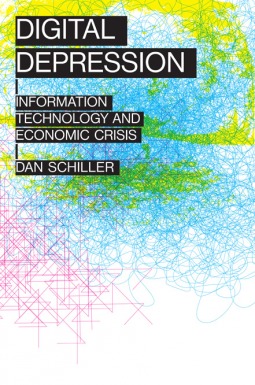No. It has nothing to do with information overload or the health problems created by the Internet boom. Conversely, the book looks at the role of information and communications technology’s (ICT) role in the years preceding the economic turmoil of this century. The author argues that digital progress is not really the savior and that it is a zero-sum game, hence Digital Depression.
Dan Schiller is a professor in the Graduate School of Library and Information Science and the Department of Communication at the University of Illinois at Urbana-Champaign. He is the author of How to Think About Information and Digital Capitalism: Networking the Global Market System.
Title: Digital Depression: Information Technology and Economic Crisis (The Geopolitics of Information)
Publisher: University of Illinois Press; 1st Edition (September 15, 2014)
ISBN-10: 0252080327
Hardcover: 344 pages
Book Review
In Part I, Digital Capitalism’s Ascent to Crisis, the author explain how the crisis’ seeds were sown in the turmoil of the 70s. To come out of the 70s’ slump, capitalists triggered a radical change in the production processes. Processes that took manufacturing from individual skill to mass production by machines, to which information and communication technologies were central. This part of the books takes a deep dive into the history of emergence of computers, networks and how it penetrated different parts of the workplace. In Networked Production and Reconstructed Commodity Chains, the author highlights the post World War II manufacturing boom and strengthening US dollar, which shifted the more laborious functions to South American and Asian countries. Furthermore, developments in the auto industry increased the amount of computer systems and software used in automobiles. The author ties in all these factors to highlight the current supremacy of the ICTs and declining value of labor in the workforce. The author further covers the increasing role of ICTs in Finance and Defense.
– 
Part II, The Recomposition of Communications, chronicles how policy changes and heavy investment in ICTs changed the existing labor force and gave a huge impetus to jobs related to computer and networking industry. AT&T and IBM were the main winners in this policy change. But is the stellar economic performance of ICTs real? Or is it just movement of capital from one area to another? The author takes a keen look at different industries to closely examine the change in capital flow. Moreover, rapid development in ICTs dried up revenue sources in many industries such as music, videos, and traditional telecom operators.
In part III, Geopolitics and Social Purpose, the author highlights how this global digital growth was dominated by US companies early on, and points to the changing topology of the Internet which has increasingly become global. The author covers the social and political tussle that is born out of this changing control over the Internet.
The book takes a comprehensive look at the star performer – ICTs – of the last three decades and provides a historical view of how digital technology impacted every facet of our lives: from how we communicate with each other to global political and social policies.
